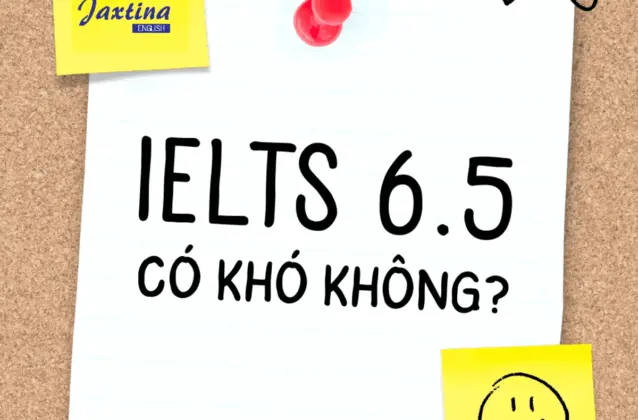

Writing Task 2 – Tổng hợp các IELTS Transition Words thông dụng

 18.01.2024
18.01.2024
 6 phút đọc
6 phút đọc 1538 lượt xem
1538 lượt xem
Trong IELTS Writing Task 2, việc sử dụng IELTS transition word sẽ giúp bài viết của bạn mượt mà, trơn tru và phần nào giúp bạn diễn tả rõ hơn, tốt hơn ý kiến của mình. Từ nối không chỉ được dùng để nối 2 vế trong câu văn mà còn để liên kết các câu văn hoặc đoạn văn với nhau. Hơn nữa, từ nối cũng là yếu tố góp phần vào Coherence and Cohesion (Sự mạch lạc và liên kết) – một trong những tiêu chí chấm điểm của bài thi IELTS Writing task 2. Vì vậy trong bài viết này, trung tâm ôn thi IELTS Jaxtina sẽ giới thiệu cho bạn những từ nối (transition words) hay được sử dụng trong IELTS Writing task 2.
Mục lục bài viết
Toggle1. Từ nối chỉ sự đối lập (Adversative transition words)
Các từ nối chỉ sự đối lập (Adversative transition words) được sử dụng để liên kết giữa 2 thông tin có nội dung trái ngược nhau thường gặp trong IELTS Writing.
| Từ nối | Nghĩa tiếng Việt | Ví dụ |
| but | nhưng | Annie has a dream of buying a car but she does not try to earn money.
(Annie có ước muốn mua xe ô tô nhưng cô ấy không cố gắng kiếm tiền.) |
| however | tuy nhiên | Jack has failed that exam more than 5 times. However, he will not give up until he passes it.
(Jack đã thi trượt bài kiểm tra đó hơn 5 lần. Tuy nhiên anh ấy sẽ không bỏ cuộc đến khi anh ấy đỗ nó.) |
| although/ even though/ despite/ in spite of | mặc dù | Although Leo has studied hard for the final exam, he did not get a high score.
(Mặc dù Leo đã chăm chỉ học hành cho bài thi cuối kỳ, anh ấy không đạt được điểm cao.) |
| on the other hand/ by contrast/ in contrast | mặt khác | From 2015 to 2016, there was a 15.24% increase in export revenue from textiles, with earnings rising from roughly $25 billion to over $30 billion. By contrast, there was almost no change in the amount of money earned from agricultural products.
(Từ năm 2015 đến năm 2016, doanh thu xuất khẩu của ngành dệt may đã tăng 15.24%, từ khoảng 25 tỷ đô la lên hơn 30 tỷ đô la. Mặt khác, hầu như không có sự thay đổi nào về thu nhập từ các sản phẩm nông nghiệp.) |
| on the contrary/ conversely | ngược lại | Jack believes that Ann has made a right choice. Conversely, I think it is a stupid choice so we are arguing.
(Jack tin rằng Ann đã lựa chọn đúng. Ngược lại, tôi nghĩ đó là một sự lựa chọn ngu ngốc nên chúng tôi đang tranh cãi.) |
Hiện trung tâm Jaxtina English Center đang có nhiều chương trình ưu đãi học phí khi đăng ký combo 2 khóa học trở lên cũng nhiều khuyến mãi khác. Điền ngay thông tin vào form bên dưới để đăng ký nhận thông tin chi tiết về chương trình ưu đãi nhé!
>>>> Click Ngay: Luyện đề IELTS | Trọn bộ đề thi IELTS mới nhất [Tải miễn phí]
2. Từ nối chỉ nguyên nhân, kết quả, mục đích
| Từ nối | Nghĩa tiếng Việt | Ví dụ |
| as a result | kết quả là |
Leo had spent a lot of time on playing games so as a result, he failed the final test. (Leo đã dành nhiều thời gian để chơi game nên kết quả là anh ấy đã trượt bài kiểm tra cuối kỳ.) |
| consequently | hậu quả là | |
| hence | vì thế |
>>>> Đọc Thêm: So sánh các writing style guide phổ biến nhất trên thế giới
3. Từ nối chỉ sự bổ sung
| Từ nối | Nghĩa tiếng Việt | Ví dụ |
| additionally/ in addition/ besides | ngoài ra |
She loves taking photos. Moreover, her parents also support her so she chooses to be a photographer. (Cô ấy rất thích chụp ảnh. Hơn nữa, bố mẹ cô cũng ủng hộ nên cô ấy chọn làm nhiếp ảnh gia.) |
| furthermore/ moreover | hơn nữa |
>>>> Tham Khảo Thêm: Những Từ Không Nên Sử Dụng Trong IELTS Writing
4. Từ nối đưa ra ví dụ
| Từ nối | Nghĩa tiếng Việt | Ví dụ |
| for example/ for instance | ví dụ là |
There are many ways to improve your speaking skill. For example, the ‘shadowing’ method is one of the most famous ways and it is very useful. (Có rất nhiều cách để bạn nâng cao trình độ nói của mình. Ví dụ như phương pháp shadowing – một trong những phương pháp nổi tiếng và nó rất hữu dụng.) |
| to demonstrate/ to clarify/ to illustrate | để làm rõ hơn |
>>>> Khám Phá Ngay: Cách luyện Writing IELTS tại nhà cực hiệu quả trong 3 tháng
5. Từ nối chỉ thứ tự
| Từ nối | Nghĩa tiếng Việt |
Ví dụ |
| firstly | thứ nhất | I do not like Jack for several reasons. Firstly, he fought with my classmates. Secondly, he does not respect my brother. Thirdly, he does not care about other people. Finally, he once took my book without permission.
(Tôi không thích Jack vì vài lý do. Thứ nhất, anh ấy đã đánh nhau với bạn cùng lớp của tôi. Thứ hai, anh ấy không tôn trọng anh trai tôi. Thứ ba, anh ấy không quan tâm đến những người khác. Cuối cùng, anh ấy đã từng lấy sách của tôi mà không xin phép.) |
| secondly | thứ hai | |
| thirdly | thứ ba | |
| finally | cuối cùng | |
| subsequently | sau đó | He was badly injured in a car accident and subsequently died.
(Anh ấy đã bị thương nặng trong một tai nạn xe và sau đó qua đời.) |
6. Từ nối chỉ sự tóm tắt
| Từ nối | Nghĩa tiếng Việt |
Ví dụ |
| in conclusion | tóm lại | In conclusion, I hate Jack for all the aforementioned reasons.
(Tóm lại, tôi ghét Jack vì những lý do đã nêu trên.) |
| to summarise | ||
| in short | ||
| to sum up | ||
| in summary |
Hãy thử áp dụng những từ vựng ở trên vào bài tập sau đây nhé!
7. Bài tập vận dụng cho IELTS writing task 2
You should spend about 40 minutes on this task.
Write about the following topic:
| Many people believe that social networking sites (such as Facebook) have had a huge negative impact on both individuals and society. To what extent do you agree? |
Give reasons for your answer and include any relevant examples from your own knowledge or experience.
Write at least 250 words.
| Sample essay
Social networking sites, for instance, Facebook, are thought by some to have had a detrimental effect on individual people as well as society and local communities. However, while I believe that such sites are mainly beneficial to the individual, I agree that they have had a damaging effect on local communities.With regards to individuals, the impact that online social media has had on each individual person has clear advantages. Firstly, people from different countries are brought together through such sites as Facebook whereas, before the development of technology and social networking sites, people rarely had the chance to meet or communicate with anyone outside of their immediate circle or community. Secondly, Facebook also has social groups which offer individuals a chance to meet and participate in discussions with people who share common interests.On the other hand, the effect that Facebook and other social networking sites have had on societies and local communities can only be seen as negative. Rather than individual people taking part in their local community, they are instead choosing to take more interest in people online. Consequently, the people within local communities are no longer forming close or supportive relationships. Furthermore, society as a whole is becoming increasingly disjointed and fragmented as people spend more time online with people they have never met face to face and who they are unlikely to ever meet in the future.To conclude, although social networking sites have brought individuals closer together, they have not had the same effect on society or local communities. Local communities should do more to try and involve local people in local activities in order to promote the future of community life. Nguồn tham khảo: IELTS Liz* Một số từ vựng đáng chú ý.
|
Trên đây Jaxtina đã chia sẻ cho bạn những từ nối (IELTS transition words) hay dùng trong bài thi IELTS Writing task 2, mong rằng bài viết này sẽ bổ ích cho bạn. Và hãy tham khảo ngay các khóa học IELTS của Jaxtina nếu bạn đang phân vân không biết chọn nơi nào để ôn luyện IELTS nhé, Jaxtina đảm bảo rằng bạn sẽ đạt được mục tiêu của mình sau khi các hoàn thành khóa học, còn chần chừ gì nữa, hãy mau đăng ký ngay để nhận được nhiều ưu đãi nhé.
Jaxtina chúc bạn học tốt!
>>>> Tiếp Tục Với:
- Cấu trúc bài thi IELTS Writing Chi Tiết Chuẩn Xác Nhất
- Các chủ đề thường gặp trong IELTS Writing Task 2 kèm bài mẫu
Bài viết cùng chuyên mục

 24.11.2025
24.11.2025 13 phút đọc
13 phút đọc 6166 xem
6166 xem
Bằng IELTS 6.5 cao hay thấp, được tuyển thẳng đại học nào?

 24.11.2025
24.11.2025 18 phút đọc
18 phút đọc 3413 xem
3413 xem
Học IELTS General ở đâu? 6 trung tâm dạy IELTS General chất…

 24.11.2025
24.11.2025 17 phút đọc
17 phút đọc 3674 xem
3674 xem
Học IELTS 1 kèm 1 Có Nên Không? Giải pháp học cá…

-
Đăng ký thông tin:Điền thông tin liên hệ và lựa chọn cơ sở Jaxtina gần nhất
-
Đặt lịch hẹn:Tư vấn viên sẽ gọi lại bạn để xác nhận thông tin & mục tiêu học tập của bạn
-
Xây dựng lộ trình cá nhân hoá:Đến trung tâm và tham gia kiểm tra trình độ miễn phí. Bài kiểm tra sẽ giúp xác định chính xác lộ trình và thời gian bạn đạt mục tiêu
-
Bắt đầu:Bắt đầu hành trình thay đổi tương lai của bạn
Để giúp bạn lựa chọn khoá học phù hợp,
tối ưu thời gian và chi phí nhất,
bạn hãy điền chính xác các thông tin bên dưới nhé!
ĐĂNG KÝ THI THỬ IELTS
Để giúp bạn xác định được band điểm IELTS hiện tại và lựa chọn lịch thi phù hợp, hãy điền chính xác thông tin đăng ký bên dưới nhé!
Đăng ký thành công
Jaxtina đã nhận thông tin đăng ký của bạn.

 Tư vấn nhanh
Tư vấn nhanh
 Chat tư vấn
Chat tư vấn
 Chat Messenger
Chat Messenger
 Chat Zalo
Chat Zalo
 +1900 63 65 64
+1900 63 65 64